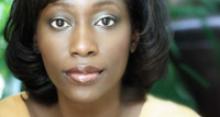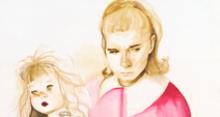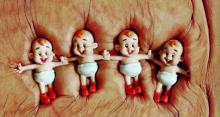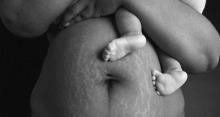On Being a Black Mom
Big Ideas
Leading thinkers and activists share game-changing ideas about motherhood and improving maternal health and women's rights.
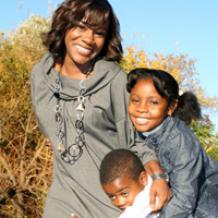
I entered motherhood double-degreed, successful, high earning, and unmarried, and it became clear from the glances of nurses and the blaringly empty "Father's Name" line on my child's birth certificate that my identity had been formed decades before my existence, by people, powers, and forces which I could never control. "Black single mother" was all they saw that day, unable to sense my Ivy League education from my hospital gown.
Who am I? I am a black woman. From the day of my own birth this has been my primary identity. Black female child. Black female girl. Black female woman. And so it was my presumption that this would forever be my central identity, and all my other roles: wife, daughter, sister, mother, professional, friend --would orbit around that. The moons to my black North star.
But from the moment I became a mother I felt my universe shift. My identity forever altered in a way that I had never suspected.
I entered motherhood double-degreed, successful, high earning, and unmarried, and it became clear from the glances of nurses and the blaringly empty "Father's Name" line on my child's birth certificate that my identity had been formed decades before my existence, by people, powers, and forces which I could never control. "Black single mother" was all they saw that day, unable to sense my Ivy League education from my hospital gown. There was a stereotype about "bad" black mothers, and that became my identity to some.
Four years later and married, I gave birth to a beautiful black boy. And I saw my identity shift and my mothering burden grow heavier. For to give birth to an endangered species, in a societal environment that does not value but mostly fears the black male, caused yet another adjustment to my identity. Black mothers breed trouble. Or athletes.
It became painfully clear to me that ideas about black mothers were deeply entrenched and beyond my control. In fact, the slow demise of black motherhood began in slavery where we were viewed as breeders producing commodities, not as real humans, and therefore we had no control over our experience in motherhood or our children. As slaves, our children were often ripped from our bosoms and sold, as we stood helpless in despair. What followed was a long tradition of pathologizing black motherhood. As a result, mainstream culture still sees black motherhood as a distortion of true motherhood ideals, and therefore unworthy of true parity with the white woman's experience.
The stigma of Daniel Patrick Moynihan’s 1965 report “The Negro Family: The Case for National Action,” which designated black mothers as the principal cause of a culture of pathology, stuck. Moynihan’s research predated the 1964 Civil Rights Act, but instead of identifying the structural barriers facing African-American communities, he blamed black mothers for the state of African-American families. The now-infamous Moynihan Report encouraged the nation not to view black mothers as women doing the best they could in tough circumstances, but instead to blame them as unrelenting cheats who unfairly demand assistance from the system.
The stigma stuck.
And if Walter Lippmann is correct in saying that how we come to understand the world is a function of the “pictures in our heads,” and that the media plays a crucial role in the formation of these images, then the collective identity of African-American mothers is in crisis.
Because the “pictures in our heads” of black mothers, thanks to American cultural stereotypes, Hollywood, and media images, depict them as crackheads, single mothers with deadbeat-dad issues, welfare queens, violent, uneducated, neck-rolling sassy maids, smart-talking fishwives. Alternatively, we are being portrayed by a man, in a fat suit and a wig, per Eddie Murphy and Tyler Perry films so popular here in the US. We are rarely seen as nurturing mothers or (gasp!) intentional parents with committed husbands, let alone successful women who don trendy shoes, fabulous handbags, and have some of the same romantic-comedy-worthy struggles as any other parent or would-be parent.
Years ago, all we had was Claire Huxtable from "The Cosby Show," the popular American TV show from the 80s As a teenager, I glued my eyes to the TV every Thursday night dreaming about a high-powered career, well-appointed brownstone (or other dream house), and a professional man who rubbed my feet even though he had a tiring day too. She was the original strong black woman with a career, beautiful kids and a successful man who adored her. Claire Huxtable was the first time we saw a black mother having it all—not just taking care of somebody else's family. We looked to fictional characters for a rare glimpse into a life TV that white women had been enjoying for years.
Claire Huxtable would have a whole lot to say about the current portrayals of black women. Just pan the channels, and you'll see black women as drink-tossing, weave-snatching, oh-know-you-didn't single moms in some sort of conflict with a man or the father of our children. These kinds of stereotypes are dangerous especially with very few positive images to counter them. What a shame.
Even with a highly educated, modern black woman who is a self-described “mom in chief” serving as the First Lady of the United States, black women are not included in any of the mainstream mommy dialogue in this country — which is dominated by white and affluent voices. We aren’t seen as thinkers in this mommy movement who have an important perspective in shaping the future of maternity leave and child-care issues. Nor is our journey in motherhood and middle-class angst and bliss told in cutesy books or on network sitcoms about modern family.
Ever since I launched MochaManual.com, I've been having an honest and robust conversation about the life as a mother of color, including the media stereotypes and negative misconceptions about black moms. In those online and offline conversations, we've lamented our invisibleness and not being viewed as intentional, nurturing mothers and women who love and cherish their own children. We've been angry that we are viewed as ideal candidates for taking care of others' people children but somehow unfit to raise our own.
We want the world to see black motherhood for what it is--as varied and complex as any other motherhood experience. And that is all good.
Related Content
|
A woman's worth is often evaluated based on her performance as a mother, but Hafsat Abiola says it's even more important for women to make a difference outside the home. |
Catherine Haley Epstein’s paintings touch on the many ways women’s identities shift and change when they become mothers. |
Artist Shira Richter, a mother to twins, uses her own body as a medium for her art. She discusses the message she's aiming for, and the surprising responses she receives. |
Margaret Lazarus’ film “BirthMarkings” explores our post birth bodies—and how our self-image—change after giving birth. |


